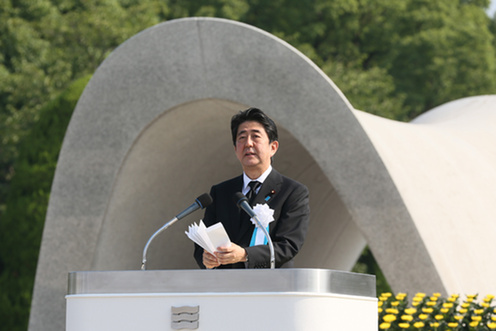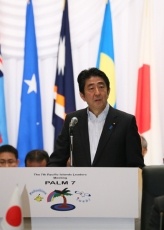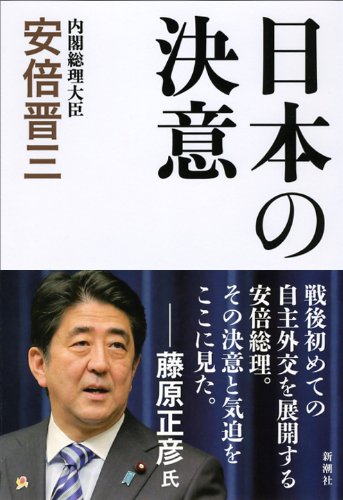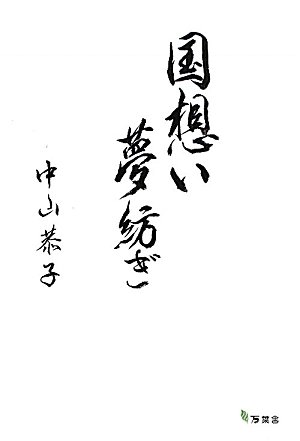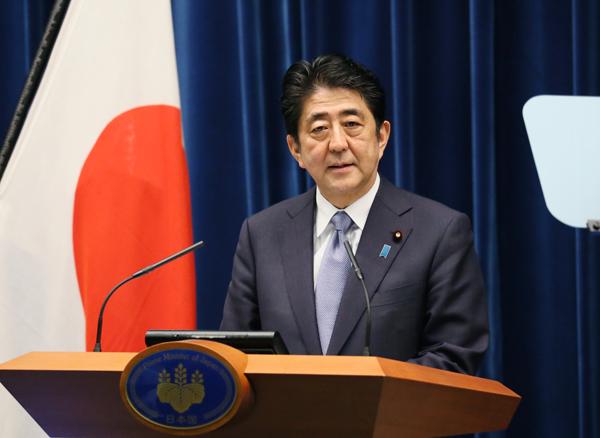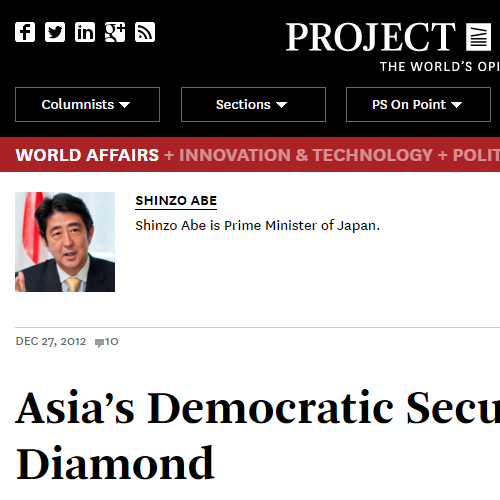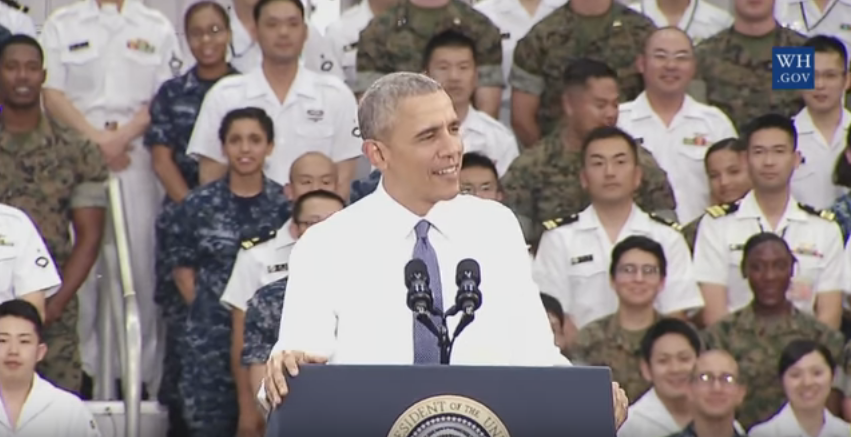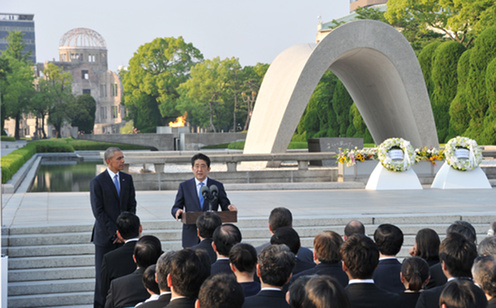
オバマ大統領広島訪問 オバマ・安倍演説全文(和訳・英文)
ページに広告が含まれる場合があります。
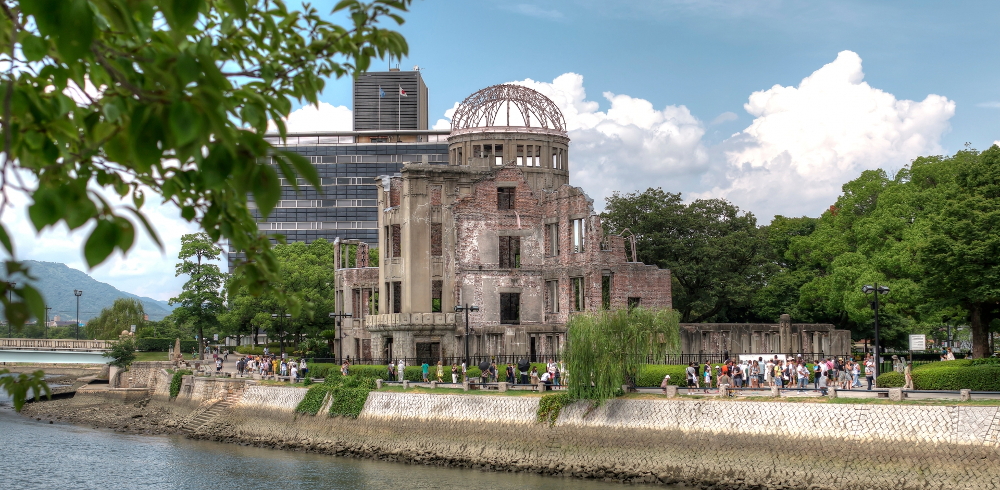
オバマ大統領は27日、現職のアメリカ大統領として初めて被爆地・広島を訪問し、核兵器のない世界への決意を表明しました。
広島訪問の動きで思いつくところをまとめてみました。
オバマ大統領広島訪問
オバマ大統領は14時10分頃、平和公園で安倍総理大臣や岸田外務大臣の出迎えを受け、見学するかどうか明かされていなかった原爆資料館を訪れました。
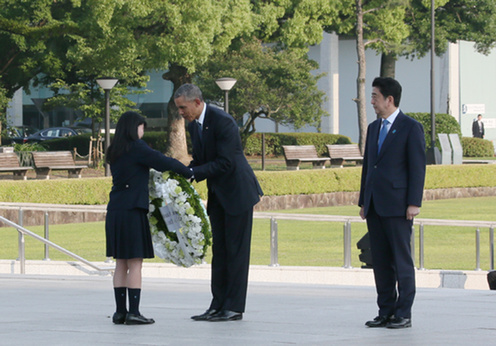
そして、広島と長崎の両市長や被爆者たちが見守るなか、原爆慰霊碑に献花し、後述の通り所感を述べました。

この中でオバマ大統領は「核兵器のない世界を追求しなければならない」と述べ、核兵器のない世界への決意を表明。
そのあと、オバマ大統領は日本被団協(日本原水爆被害者団体協議会)の代表委員 坪井直さんなど、被爆者の人たちと握手を交わしたり、時には抱き合って話をしました。
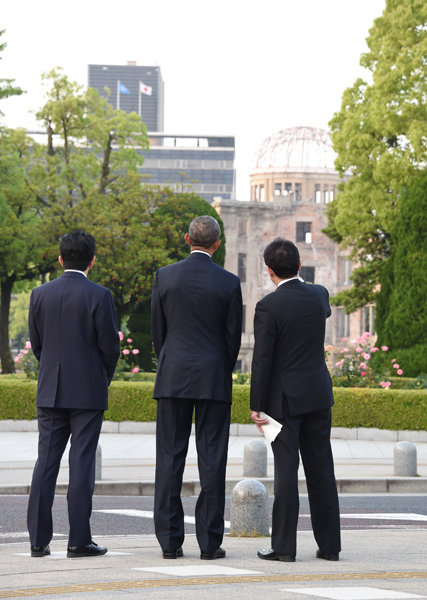
最後に、安倍総理大臣と岸田外務大臣とともに原爆ドームを視察し、岸田大臣から説明を受けた後、車に乗り込んで平和公園をあとにしました。
オバマ大統領は18時40分頃、ヘリコプターで広島を出発し、山口県のアメリカ軍岩国基地を経て帰国します。
被爆者の方々の反応
現地に参加していた被爆者の方々、テレビでこの様子を見ていた被爆者の方々のインタビューを見ました。
被爆者のみなさんが一様に明るい表情だったのが、非常に印象的でした。
見ながら涙を流していたある女性は涙の理由を聞かれ「長年の苦労を思い出したが、うれし涙です」と語っていました。
また、みなさん異口同音に、世界のどこにも同じことが繰り返されないように願っておられたこと、オバマの演説内容について満足し納得しておられたことが印象に残りました。
本当に立派な方々で、誇りに思います。
アメリカメディアの反応
オバマ米大統領の27日の広島訪問について、米メディアは米時間の未明にもかかわらず通信社が速報、テレビ各局が平和記念公園で所感を述べるオバマ氏を「歴史的」(CNNテレビ)だとして生中継、高い関心を示した。
AP通信は米東部時間27日午前4時(日本時間同日午後5時)すぎ「オバマ氏が広島到着、被爆地を訪れた初の現職大統領になった」と速報。 CNN、FOXニュース、MSNBCテレビなどが所感表明を生中継。 CNNの記者は広島から、日本側がオバマ氏の訪問を待ち望んでいたとし「必ずしも謝罪を求めているわけではない」と報告。 ワシントン・ポスト紙電子版は「厳粛な訪問」と報じ「これまでの歴代米大統領は謝罪と受け止められることを懸念して被爆地訪問を避けてきた」と解説した。 参考文献:共同通信
スピーチを終え、原爆ドームに向かう途中のオバマ大統領と安倍首相の会話
追記です。先ほど(27日夜)プライムニュースを見ていたら、以下の情報が紹介されていました。
| オバマ大統領 | 「今回広島に来ることができて、本当によかった」 |
| 安倍首相 | 「今回の訪問は ‘ 核なき世界 ’ に向けた大きな一歩になることは間違いない」 |
| オバマ大統領 | 「これから晋三と一緒にやるべきことがたくさんある。今日はあくまでスタートだ」 |
出典:BSフジ プライムニュース
こんなところで、また韓国
ところでこの日、羽田空港で機体から煙を出して騒ぎになった大韓航空機。
6万5千人以上の移動に影響が出たそうなんですが・・・
大韓航空機が27日、羽田空港で機体から煙を出し、滑走路上に停止したトラブルにより滑走路が閉鎖された影響で、オバマ米大統領が同日午後に広島市を訪れ、原爆慰霊碑に献花する行事に広島県選出の国会議員が出席できなくなっていたことがわかった。
多くの国会議員がこの日午後の便で広島へ向かう予定だったといい、中川俊直衆院議員は自身のホームページで「残念ながら、羽田空港での事故により滑走路が閉鎖。飛行機が欠航となり、広島への帰広がかないませんでした」と報告した。
出典:産経新聞
現在の情報では、テロなどの痕跡はないそうです。
オバマ大統領演説(和訳)
71年前の雲一つない明るい朝、空から死が舞い降り、世界は変わった。閃光(せんこう)と火柱が都市を破壊し、人類は自ら破壊する手段を手にすることを示した。
われわれはなぜ広島に来たのか。そう遠くない過去に解き放たれた残虐な力に思いをめぐらせるためだ。われわれは命を落とした10万人を超える日本の男女、子供、何千人もの朝鮮半島出身者、十数人の米国人捕虜を悼む。
その魂が私たちに話しかけてくる。彼らはわれわれに対し、もっと内なる心に目をむけ、自分の今の姿とこれからなるであろう姿を見るように訴える。
広島を際立たせているのは、戦争という事実ではない。過去の遺物は、暴力による争いが最初の人類とともに出現していたことをわれわれに教えてくれる。初期の人類は、火打ち石から刃物を作り、木からやりを作る方法を学び、これらの道具を、狩りだけでなく同じ人類に対しても使った。
いずれの大陸も文明の歴史は戦争で満ちており、食糧不足や黄金への渇望に駆り立てられ、民族主義者の熱意や宗教上の熱情にせき立てられた。帝国は台頭し、そして衰退した。民族は支配下に置かれ、解放されたりしてきた。転換点において罪のない人々が苦しみ、数え切れない多くの人が犠牲となり、彼らの名前は時がたつと忘れ去られてきた。
広島と長崎で残酷な終焉(しゅうえん)を迎えた世界大戦は、最も豊かで強い国家間で勃発した。彼らの文明は偉大な都市と素晴らしい芸術を育んでいた。思想家は正義と調和、真実という理念を発達させていた。しかし、戦争は、初期の部族間で争いを引き起こしてきたのと同様に支配あるいは征服の基本的本能により生じてきた。抑制を伴わない新たな能力が、昔からのパターンを増幅させた。
ほんの数年の間で約6千万人が死んだ。男性、女性、子供たちはわれわれと変わるところがない人たちだった。撃たれたり、殴られたり、連行されたり、爆弾を落とされたり、投獄されたり、飢えさせられたり、毒ガスを使われたりして死んだ。
世界各地には、勇気や勇敢な行動を伝える記念碑や、言葉にできないような悪行を映す墓や空っぽの収容所など、この戦争を記録する場所が多くある。
しかし、この空に上がった、きのこ雲のイメージが、われわれに人類の根本的な矛盾を想起させた。われわれを人類たらしめる能力、思想、想像、言語、道具づくりや、自然とは違う能力、自然をわれわれの意志に従わせる能力、これらのものが無類の破壊能力をわれわれにもたらした。
物質的進歩や社会革新がこの真実から、われわれの目を曇らせることがどれほど多いであろうか。高邁(こうまい)な理由で暴力を正当化することはどれほど安易なことか。
偉大な全ての宗教は愛や平和、公正な道を約束している。一方で、どの宗教もその信仰が殺人を許容していると主張するような信者の存在から逃れることはない。
国家は、犠牲と協力を結び付ける物語をつむぎながら発展してきた。さまざまな偉業を生んだが、この物語が抑圧や相違を持つ人々の人間性を奪うことにも使われてきた。科学はわれわれに海を越えてコミュニケーションを取ることを可能にし、空を飛び、病気を治し、宇宙を理解することを可能にした。しかし同じ発見は、より効果的な殺人機械へとなり得る。
現代の戦争はこうした真実をわれわれに伝える。広島はこの真実を伝える。人間社会の発展なき技術の進展はわれわれを破滅させる。原子核の分裂につながった科学的な革命は、倫理上の革命も求められることにつながる。
だからこそわれわれはこの地に来た。この街の中心に立ち、爆弾が投下されたときの瞬間について考えることを自らに強いる。惨禍を目にした子供たちの恐怖を感じることを自らに課す。
無言の泣き声に耳を澄ませる。われわれはあの恐ろしい戦争やその前の戦争、その後に起きた戦争で殺された全ての罪なき人々に思いをはせる。
単なる言葉でその苦しみを表すことはできない。しかし、われわれは歴史を直視し、そのような苦しみを繰り返さないために何をしなければならないかを問う共通の責任がある。
いつの日か、生き証人たちの声は聞こえなくなるだろう。しかし1945年8月6日の朝の記憶は決して風化させてはならない。記憶はわれわれの想像力を養い、われわれを変えさせてくれる。
あの運命の日以来、われわれは希望をもたらす選択もしてきた。米国と日本は同盟関係を築くだけでなく、戦争を通じて得られるものよりももっと多くのものを国民にもたらす友情を築いた。
欧州の国々は戦場に代わって、交易や民主主義により結ばれている。抑圧された人々や国々は自由を勝ち取った。国際社会は戦争を回避し、核兵器の存在を規制、削減し、完全に廃絶するための機関を創設し協定を結んだ。
それにも関わらず、世界中で見られる国家間のテロや腐敗、残虐行為や抑圧は、われわれがすべきことには終わりがないことを示している。われわれは人類が悪事を働く能力を除去することはできないかもしれないし、われわれが同盟を組んでいる国々は自らを守る手段を持たなければならない。
しかし、わが国を含む、それらの国々は核兵器を貯蔵しており、われわれは恐怖の論理から抜け出し、核兵器のない世界を希求する勇気を持たなければならない。こうした目標は私の生きている間は実現しないかもしれないが、粘り強い取り組みが惨禍の可能性を引き下げる。
われわれはこうした保有核兵器の廃棄に導く道筋を描くことができる。われわれは、新たな国々に拡散したり、致死性の高い物質が狂信者の手に渡ったりするのを防ぐことができる。しかし、まだそれでは不十分だ。なぜなら、われわれは今日、世界中で原始的なライフル銃やたる爆弾でさえ恐るべきスケールの暴力をもたらすことができることを、目の当たりにしているからだ。
われわれは戦争そのものに対する考え方を変えなければならない。外交を通じて紛争を予防し、始まってしまった紛争を終わらせる努力するために。増大していくわれわれの相互依存関係を、暴力的な競争でなく、平和的な協力の理由として理解するために。破壊する能力によってではなく、築くものによってわれわれの国家を定義するために。そして何よりも、われわれは一つの人類として、お互いの関係を再び認識しなければならない。このことこそが、われわれ人類を独自なものにするのだ。
われわれは過去の過ちを繰り返す遺伝子によって縛られてはいない。われわれは学ぶことができる。われわれは選択することができる。われわれは子供たちに違う話をすることができ、それは共通の人間性を描き出すことであり、戦争を今より少なくなるようにすること、残酷さをたやすく受け入れることを今よりも少なくすることである。
われわれはこれらの話をヒバクシャ(被爆者)の中に見ることができる。ある女性は、原爆を投下した飛行機の操縦士を許した。本当に憎むべきは戦争そのものであることに気付いたからだ。ある男性は、ここで死亡した米国人の家族を探し出した。その家族の失ったものは、自分自身が失ったものと同じであることに気付いたからだ。
わが国は単純な言葉で始まった。「人類は全て、創造主によって平等につくられ、生きること、自由、そして幸福を希求することを含む、奪うことのできない権利を与えられている」
理想は、自分たちの国内においてさえ、自国の市民の間においてさえ、決して容易ではない。しかし誠実であることには、努力に値する。追求すべき理想であり、大陸と海をまたぐ理想だ。
全ての人にとってかけがえのない価値、全ての命が大切であるという主張、われわれは人類という一つの家族の仲間であるという根本的で必要な概念。われわれはこれら全ての話を伝えなければならない。
だからこそ、われわれは広島に来たのだ。われわれが愛する人々のことを考えられるように。朝起きた子供たちの笑顔をまず考えられるように。食卓越しに、夫婦が優しく触れ合うことを考えられるように。両親の温かい抱擁を考えられるように。
われわれがこうしたことを考えるとき71年前にもここで同じように貴重な時間があったことを思い起こすことができる。亡くなった人々はわれわれと同じ人たちだ。
普通の人々はこれを理解すると私は思う。彼らは、さらなる戦争を望んでいない。彼らは、科学は生活をより良いものにすることに集中すべきで、生活を台無しにすることに集中してはならないと考えるだろう。
各国の選択が、あるいは指導者たちの選択がこの単純な分別を反映すれば、広島の教訓は生かされる。
世界はここ広島で永久に変わってしまったが、この街の子供たちは平和に日常を過ごしている。なんと貴重なことであろうか。これは守るに値し、すべての子供たちに広げていくに値する。これはわれわれが選択できる未来なのだ。
広島と長崎の将来は、核戦争の夜明けとしてでなく、道徳的な目覚めの契機の場として知られるようになるだろう。そうした未来をわれわれは選び取る。
出典:産経新聞
オバマ大統領演説(英文)
Seventy-one years ago, on a bright cloudless morning, death fell from the sky and the world was changed. A flash of light and a wall of fire destroyed a city and demonstrated that mankind possessed the means to destroy itself.
Why do we come to this place, to Hiroshima? We come to ponder a terrible force unleashed in the not so distant past. We come to mourn the dead, including over 100,000 Japanese men, women and children, thousands of Koreans and a dozen Americans held prisoner.
Their souls speak to us. They ask us to look inward, to take stock of who we are and what we might become.
It is not the fact of war that sets Hiroshima apart. Artifacts tell us that violent conflict appeared with the very first man. Our early ancestors, having learned to make blades from flint and spears from wood, used these tools not just for hunting but against their own kind.
On every continent the history of civilization is filled with war, whether driven by scarcity of grain or hunger for gold, compelled by nationalist fervor or religious zeal. Empires have risen and fallen, peoples have been subjugated and liberated, and at each juncture innocents have suffered — a countless toll, their names forgotten by time.
The World War that reached its brutal end in Hiroshima and Nagasaki was fought among the wealthiest and most powerful of nations. Their civilizations had given the world great cities and magnificent art. Their thinkers had advanced ideas of justice and harmony and truth, and yet the war grew out of the same base instinct for domination or conquest that had caused conflicts among the simplest tribes, an old pattern amplified by new capabilities and without new constraints.
In the span of a few years some 60 million people would die: men, women, children — no different than us, shot, beaten, marched, bombed, jailed, starved, gassed to death.
There are many sites around the world that chronicle this war — memorials that tell stories of courage and heroism, graves and empty camps that echo of unspeakable depravity.
Yet in the image of a mushroom cloud that rose into these skies, we are most starkly reminded of humanity’s core contradiction — how the very spark that marks us as a species, our thoughts, our imagination, our language, our tool making, our ability to set ourselves apart from nature and bend it to our will — those very things also give us the capacity for unmatched destruction.
How often does material advancement or social innovation blind us to this truth? How easily do we learn to justify violence in the name of some higher cause?
Every great religion promises a pathway to love and peace and righteousness. And yet no religion has been spared from believers who have claimed their faith has a license to kill.
Nations arise telling a story that binds people together in sacrifice and cooperation, allowing for remarkable feats, but those same stories have so often been used to oppress and dehumanize those who are different. Science allows us to communicate across the seas, fly above the clouds, to cure disease and understand the cosmos. But those same discoveries can be turned into ever more efficient killing machines.
The wars of the modern age teach us this truth. Hiroshima teaches this truth. Technological progress without an equivalent progress in human institutions can doom us. The scientific revolution that led to the splitting of an atom requires a moral revolution as well.
That is why we come to this place. We stand here in the middle of this city and force ourselves to imagine the moment the bomb fell. We force ourselves to feel the dread of children confused by what they see.
We listen to a silent cry. We remember all the innocents killed across the arc of that terrible war, and the wars that came before, and the wars that would follow.
Mere words cannot give voice to such suffering. But we have a shared responsibility to look directly into the eye of history and ask what we must do differently to curb such suffering again.
Some day the voices of the Hibakusha will no longer be with us to bear witness. But the memory of the morning of August 6, 1945 must never fade. That memory allows us to fight complacency. It fuels our moral imagination, it allows us to change.
And since that fateful day we have made choices that give us hope. The United States and Japan forged not only an alliance, but a friendship that has won far more for our people that we can ever claim through war.
The nations of Europe built a union that replaced battlefields with bonds of commerce and democracy. Oppressed peoples and nations won liberation. An international community established institutions and treaties that worked to avoid war and aspired to restrict and roll back and ultimately eliminate the existence of nuclear weapons.
Still, every act of aggression between nations, every act of terror and corruption and cruelty and oppression that we see around the world shows our work is never done. We may not be able to eliminate man’s capacity to do evil, so nations and the alliances that we formed must possess the means to defend ourselves.
Among those nations like my own that hold nuclear stockpiles, we must have the courage to escape the logic of fear and pursue a world without them. We may not realize this goal in my lifetime, but persistent effort can roll back the possibility of catastrophe.
We can chart a course that leads to the destruction of these stockpiles, we can stop the spread to new nations, and secure deadly materials from fanatics. And yet that is not enough, for we see around the world today how even the crudest rifles and barrel bombs can serve up violence on a terrible scale.
We must change our mindset about war itself — to prevent conflicts through diplomacy and strive to end conflicts after they’ve begun; to see our growing interdependence as a cause for peaceful cooperation and not violent competition; to define our nations not by our capacity to destroy but by what we build. And perhaps above all we must reimagine our connection to one another as members of one human race — for this too is what makes our species unique.
We’re not bound by genetic code to repeat the mistakes of the past. We can learn. We can choose. We can tell our children a different story, one that describes a common humanity, one that makes war less likely and cruelty less easily accepted.
We see these stories in the Hibakusha: the woman who forgave a pilot who flew the plane that dropped the atomic bomb because she recognized what she really hated was war itself; the man who sought out families of Americans killed here because he believed their loss was equal to his own.
My own nation’s story began with simple words: “All men are created equal, and endowed by our Creator with certain unalienable rights, including life, liberty and the pursuit of happiness.”
Realizing that ideal has never been easy, even within our own borders, even among our own citizens. But staying true to that story is worth the effort. It is an ideal to be strived for, an ideal that extends across continents and across oceans.
The irreducible worth of every person, the insistence that every life is precious, the radical and necessary notion that we are part of a single human family: that is the story that we all must tell.
That is why we come to Hiroshima, so that we might think of people we love, the first smile from our children in the morning, the gentle touch from a spouse over the kitchen table, the comforting embrace of a parent.
We can think of those things and know that those same precious moments took place here 71 years ago. Those who died, they are like us.
Ordinary people understand this, I think. They do not want more war. They would rather that the wonders of science be focused on improving life and not eliminating it.
When the choices made by nations, when the choices made by leaders reflect this simple wisdom, then the lesson of Hiroshima is done.
The world was forever changed here, but today the children of this city will go through their day in peace. What a precious thing that is. It is worth protecting and then extending to every child.
That is a future we can choose, a future in which Hiroshima and Nagasaki are known not as the dawn of atomic warfare, but as the start of our own moral awakening.
出典:共同通信
安倍首相演説(全文)
昨年、戦後70年の節目に当たり、私は、米国を訪問し、米国の上下両院の合同会議において、日本の内閣総理大臣として、スピーチを行いました。
あの戦争によって、多くの米国の若者たちの夢が失われ、未来が失われました。その苛烈な歴史に、改めて思いをいたし、先の戦争で斃(たお)れた、米国の全ての人々の魂に、とこしえの哀悼を捧げました。そして、この70年間、和解のために力を尽くしてくれた日米両国全ての人々に、感謝と尊敬の念を表しました。
熾烈に戦いあった敵は、70年の時を経て、心の紐帯(ちゅうたい)を結ぶ友となり、深い信頼と友情によって結ばれる同盟国となりました。そうして生まれた日米同盟は、世界に「希望」を生み出す同盟でなければならない。私は、スピーチで、そう訴えました。
あれから1年。今度は、オバマ大統領が、米国のリーダーとして初めて、この被爆地・広島を訪問してくれました。
米国の大統領が、被爆の実相に触れ、「核兵器のない世界」への決意を新たにする。「核なき世界」を信じてやまない世界中の人々に、大きな「希望」を与えてくれました。
広島の人々のみならず、全ての日本国民が待ち望んだ、この歴史的な訪問を心から歓迎したいと思います。
日米両国の和解、そして信頼と友情の歴史に、新たなページを刻む、オバマ大統領の決断と勇気に対して、心から皆様と共に敬意を表したいと思います。先ほど、私とオバマ大統領は、先の大戦において、そして原爆投下によって犠牲となった全ての人々に対し、哀悼の誠を捧げました。
71年前、広島、そして長崎では、たった一発の原子爆弾によって、何の罪もない、たくさんの市井の人々が、そして子供たちが、無残にも犠牲となりました。一人一人に、それぞれの人生があり、夢があり、愛する家族があった。この当然の事実を噛みしめる時、ただただ、断腸の念を禁じ得ません。
今なお、被爆によって、大変な苦痛を受けておられる方々も、いらっしゃいます。71年前、正にこの地にあって、想像を絶するような悲惨な経験をした方々の「思い」。それは、筆舌に尽くし難いものであります。様々な「思い」が去来したであろう、その胸の中にあって、ただ、このことだけは間違いありません。
世界中のどこであろうとも、
再び、このような悲惨な経験を
決して繰り返させてはならない。この痛切な「思い」をしっかりと受け継いでいくことが、今を生きる私たちの責任であります。
「核兵器のない世界」を必ず実現する。その道のりが、いかに長く、いかに困難なものであろうとも、絶え間なく、努力を積み重ねていくことが、今を生きる私たちの責任であります。そして、あの忘れ得ぬ日に生まれた子供たちが、恒久平和を願って点(とも)した、あの「灯(ともしび)」に誓って、世界の平和と繁栄に力を尽くす、それが、今を生きる私たちの責任であります。
必ずや、その責任を果たしていく。日本と米国が、力を合わせて、世界の人々に「希望を生み出す灯」となる。この地に立ち、オバマ大統領と共に、改めて、固く決意しています。
そのことが、広島、長崎で原子爆弾の犠牲となった、数多(あまた)の御霊の思いに応える、唯一の道である。
私は、そう確信しています。
出典:首相官邸
日米両首脳によるステートメント 動画リンク
http://nettv.gov-online.go.jp/prg/prg13767.html

